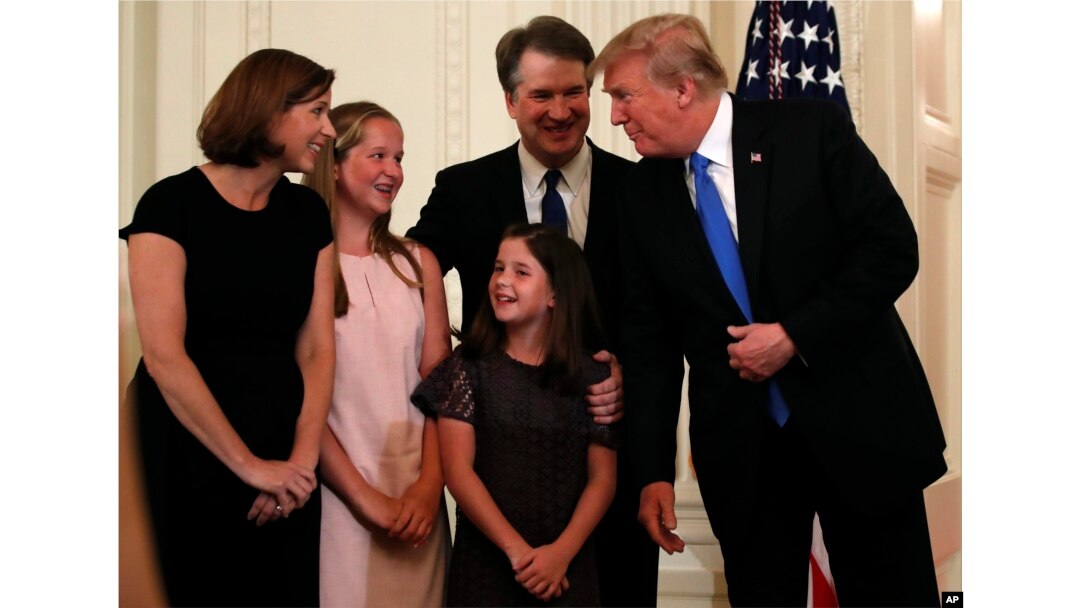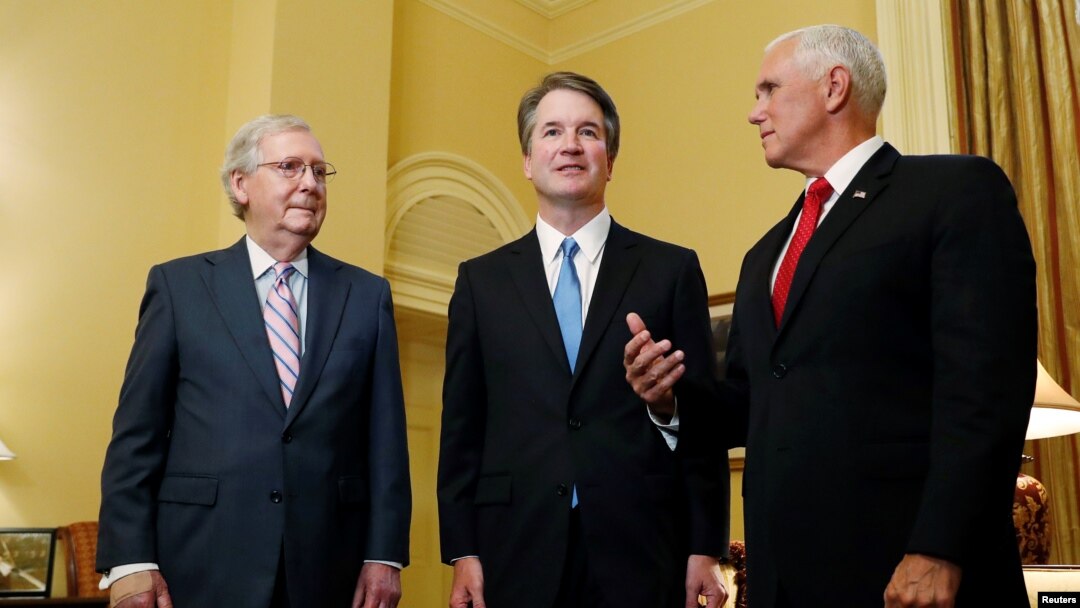One day after U.S. President Donald Trump nominated him for the Supreme Court, federal judge Brett Kavanaugh on Tuesday met with Senate Majority Leader Mitch McConnell and other top Republicans, accompanied by Vice President Mike Pence.
"The president really could not have done a better job of picking an extraordinarily well-qualified nominee," McConnell, who represents Kentucky, said after the encounter. "We believe it's possible to handle this nomination fully by the fall."
Kavanaugh, 53, took part in investigations of former President Bill Clinton, helped former President George W. Bush prevail in the 2000 Florida vote recount battle, and served in the Bush administration before Bush nominated him to the federal bench. If confirmed, he would replace retiring Supreme Court Justice Anthony Kennedy, for whom Kavanaugh once served as a clerk.

FILE - President Donald Trump talks with Judge Brett Kavanaugh and his family in the East Room of the White House, July 9, 2018.
His nomination sparked furious opposition from many Senate Democrats still bitter over Republicans' refusal to process former President Barack Obama's final high court nominee, and fearful of the impact an even more rightward-leaning court could have on America's legal landscape.
"President Trump did exactly what he said he would do on the campaign trail [in 2016]: Nominate someone who will overturn women's reproductive rights and strike down health care protections for millions of Americans," Minority Leader Chuck Schumer said, adding that "civil rights, labor rights, environmental rights, LGBTQ [sexual minority] rights" are at risk.
Another Democrat, Cory Booker of New Jersey, noted that Kavanaugh has written that presidents should be immune from prosecution while in office, an opinion that could be put to the test depending on the ultimate outcome of the special counsel's Russia probe.
"The president of the United States should not be above the law," Booker said. "The Senate should not move forward with this confirmation … until this [Russia] investigation is done."
Republicans have rejected any delays in considering Kavanaugh. Schumer urged voters to mobilize against the nomination.
FILE - Senate Minority Leader Chuck Schumer, accompanied by House Minority Leader Nancy Pelosi, speaks at a news conference about the omnibus spending bill passed by Congress in Washington, March 22, 2018.
"Now is the time for the American people to make their voices heard — loudly, clearly — from one end of this country to the other," the New York Democrat said.
Trump added Kavanaugh's name and four others to a list of two dozen jurists as potential Supreme Court nominees during the 2016 campaign — a list that generated significant enthusiasm among social conservatives who have long sought to overturn abortion rights in America, among other causes.
Whatever Kavanaugh's leanings may be on hot-button topics, Republicans accused their Democratic colleagues of elevating political considerations over the nominee's qualifications as a jurist.
"We'll do well to remember that we are evaluating a judge, not debating a candidate for political office," McConnell said
Democrats insisted their objections to Kavanaugh are legitimate.
"His views are outside the mainstream," Senator Dianne Feinstein of California said. "His record on the bench in the Bush White House and as a Republican political operative indicates that, if confirmed, he would be among the most conservative justices in Supreme Court history."
Colorado Republican Senator Cory Gardner said Democrats are engaging in "mindless partisanship," noting that several Democrats had signaled their opposition to Trump's pick before the nomination was made public.
WATCH: Trump nominates Kavanaugh to Supreme Court
Your browser doesn’t support HTML5
Trump Nominates Conservative-leaning Kavanaugh to Supreme Court
At the White House late Monday, Trump called Kavanaugh a "brilliant jurist" who has "devoted his life to public service."
Kavanaugh, for his part, said, "I revere the [U.S.] Constitution. … If confirmed by the Senate, I will keep an open mind in every case."
Republicans hold a slim, one-seat Senate majority, and a party-line vote would lead to Kavanaugh's confirmation by the narrowest of margins.
The nominee's fate may rest with two Republican senators who back abortion rights — Susan Collins of Maine and Lisa Murkowski of Alaska. Collins has said she will not vote for a nominee who would overturn the Supreme Court's landmark 1973 decision, Roe v. Wade, that legalized abortion nationwide.
But any Republican defections could be offset by centrist Democrats campaigning for re-election in conservative-leaning states Trump won handily in 2016. Conservative political action groups have already announced media campaigns to pressure them to back Kavanaugh.
While many Democratic senators swiftly issued statements rejecting Kavanaugh late Monday, Indiana's Joe Donnelly was noncommittal, pledging to "carefully review and consider the record and qualifications of Judge Brett Kavanaugh."
"Democrats simply don't have the votes [to block Kavanaugh] — they pretty much conceded as much," Rutgers University law professor Stacy Hawkins said. "They're going to do everything they can in these confirmation hearings to bring out their concerns, and the best that they can hope for is that this will really ignite this issue [rightward turn of the Supreme Court], not only for the midterm elections, but for the 2020 presidential election."


